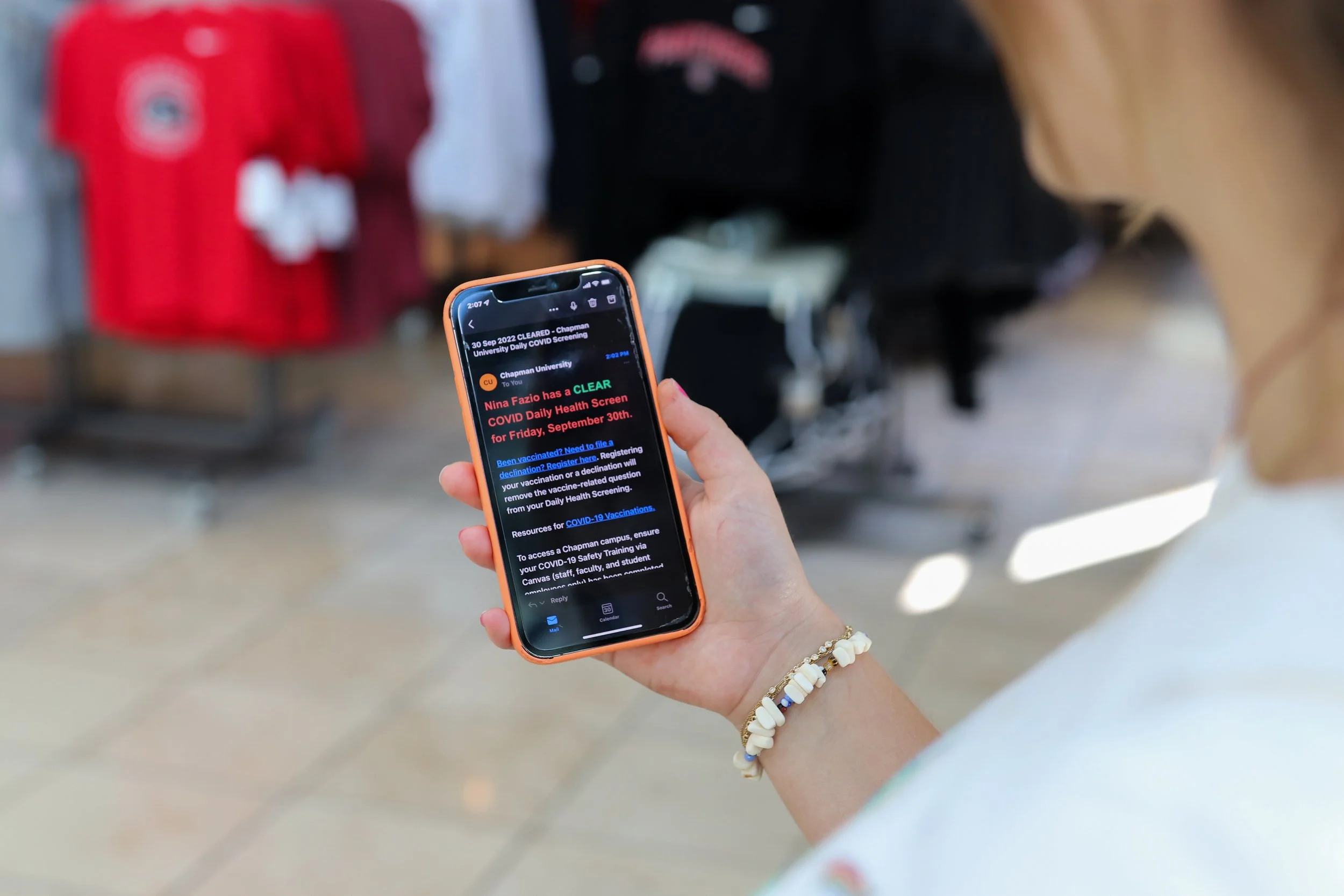Where did COVID-19 clearance monitors go?: Chapman officially changes COVID protocols
As of Sept. 26, COVID-19 protocols on campus have been eased to mirror the decrease in positive cases among the Chapman community. Photo by EMILY PARIS, photo editor
After more than two years of strict COVID-19 guidelines across a number of universities in the nation, Chapman University has begun its process in disassembling protocols and moving towards normality once again.
An email was sent out by the university Sept. 26 stating that Orange County has been classified in the “low” category, according to CDC officials. This means the county has a low hospitalization rate for COVID-19 cases, and less than 5% of people tested have been reported as positive.
“In February of 2022, the California Department of Public Health announced with their Smart Plan that we were moving from a pandemic to an endemic,” said Harold Hewitt, the executive vice president and chief operating officer at Chapman. “Stating that as an institution, we are no longer required to enforce policies. It has now fallen on the individual and their responsibility for prevention.”
Along with this change, Chapman’s COVID-19 taskforce has decided to make necessary changes on campus, such as removing the COVID-19 booster requirement, which suffered backlash in the past.
“It has been a controversy that Chapman was requiring students to get the COVID vaccine,” Hewitt told The Panther. “Some students could fill out a personal declaration form to waive this requirement, so it was never forced. Now that this requirement is gone, it is truly personal responsibility and our job to educate its importance.”
With 10% of students signing this personal declaration, according to Hewitt, the number of students without the booster is sure to increase with the requirement gone. Chapman will continue to hold vaccine and booster clinics in hopes students will take advantage of this opportunity and recognize its importance to their health, Hewitt said.
However, vaccines were not the only policy that was changed. Allied Universal employees that checked the daily COVID-19 health screenings at the doors of many high-traffic buildings, including Argyros Forum and Leatherby Libraries, have also been removed, which for undeclared sophomore Giovanna Hamed was ultimately not a positive.
“I do like the door monitors. They are all friendly, and some open the door for you, along with always being understanding,” Hamed said. “I will miss them, especially the one lady that gave everyone compliments when they walked through the door, it always brightened up people’s days.”
Many students have wondered where the monitors went and if they lost their jobs, but Hewitt explains this isn't the case.
“We have Allied Universal on contract, so if we ever need them again, we can bring them back,” Hewitt said. “With a new variant arising, this could happen during the school year, especially with experts predicting a winter surge. We also still use them for events, and when they aren't working on campus, Allied Universal assigns them to other facilities.”
Along with the Allied Universal personnel came daily COVID-19 clearance surveys that continue to be sent to student’s emails despite the removal of these monitors.
“The daily survey is still a requirement for our community, and although there is no enforcement, we have a fairly large population of students and staff that voluntarily comply,” Hewitt said. “As long as we continue to communicate our expectations, we believe for the most part, people will cooperate. “But if someone doesn’t fill out the survey and becomes sick, we will ask them why they didn’t fill out their survey. as they risk getting others sick.”
Hamed feels as though these COVID-19 surveys aren’t helping the community at Chapman, with students not being truthful while answering them.
“I never saw the point to COVID-19 checks when someone can easily lie about it,” Hamed said. “Sure, it’s a way to track everyone, but (it’s) not effective if you can just press no.”
Even though COVID-19 has become a smaller part of everyone's life, this doesn't decrease the need for caution.
“COVID-19 is still a problem,” Hamed said. “98% of my class doesn't wear a mask, and it is not hard to put one on. There are still people out there such as my mom that are immunocompromised that could die from being exposed.
“I’ve seen posts on Fizz of people saying they have COVID-19 and are still going to class. People are not taking to heart that this hurts people and could possibly kill them. It is still important to be careful, get tested and stay home if you are sick.”

